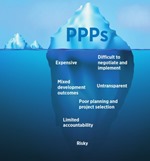Social Watch E-Newsletter - Issue 224 - July 17, 2015
Published on Fri, 2015-07-17 11:37
 |
| Issue 224 - July 17, 2015 |
|
|
|
| |
| |
|
| |
Financing for Development is ‘Preserving’ the Status Quo |
| |
|
| |
 |
Manila, Philippines–We witness state leaders, high-level officials, civil society groups, and business representatives convene for the Third International Conference on Financing for Development (FfD3) in Addis Ababa, Ethiopia to discuss and agree on an action plan for financing development, including the Sustainable Development Goals to be adopted by UN member states in the September 2015 Summit.
“We started from an optimistic viewpoint on FfD3 and now ending with so much disappointment over what seems like retrogression from old agreements. There is no mention at all of peace dividends generated from the elimination of weapons of mass destruction and nuclear weapons, and the reduction in defense spending. Debt relief and condonation are treated marginally. The emerging document suggests business as usual. It doesn’t explain the fundamental reasons for why there is lack of financing sustainable development,” lamented Isagani Serrano, co-convener of Social Watch Philippines (SWP) and president of the Philippine Rural Reconstruction Movement (PRRM). Read more
|
| |
|
| |
Civil Society Response to the Addis Ababa Action Agenda on Financing for Development
|
| |
|
| |
 |
Members of hundreds of civil society organizations and networks from around the world engaged in the Third FfD Conference, would like to express our deepest concerns and reservations on the Addis Ababa Action Agenda, based on both our ongoing contributions to the process and the deliberations of the CSO FfD Forum (Addis Ababa, 10-12 July 2015).
The Addis Ababa Action Agenda (AAAA) lost the opportunity to tackle the structural injustices in the current global economic system and ensure that development finance is people-centred and protects the environment. It does not rise to world's current multiple challenges, nor does it contain the necessary leadership, ambition and practical actions. It undermines agreements in the Monterrey Consensus and the Doha Declaration and it is almost entirely devoid of actionable deliverables. We regret that the negotiations have diminished the FfD mandate to address international systemic issues in macroeconomic, financial, trade, tax, and monetary policies, while also failing to scale up existing resources and commit new financial ones. Read more
|
| |
|
| |
|
| |
A new financial policy for the United States
|
| |
|
| |
People around the world were impacted by the 2008 financial crisis which stemmed from the US´s financial policies. The key human rights lesson from the crisis is that the economic and social rights of people and nations everywhere are interconnected.  In our inter-connected world, the US must make economic decisions that respect the human rights of all individuals who will be impacted by national, economic, financial and fiscal policy.
At one level, economic policy in the United States should be guided by the principle of progressive realization and non-retrogression. Progressive realization recognizes that the resources at the disposition of a government are limited; nevertheless, a government must take specific steps to ensure that the enjoyment of economic and social rights improves over time. Non-retrogression means that once a particular level of enjoyment of rights has been realized, it should be maintained. Read more
|
| |
|
| |
|
| |
 |
A new report launched by Eurodad examining public private partnerships (PPPs) as a way to finance development projects finds that they are risky and expensive and urges governments and financial institutions to stop hiding their true costs. he research finds that public private partnerships are expensive, risky and lack transparency. What lies beneath?: A critical assessment of public private partnerships and their impact on sustainable development examines the nature and impact of PPPs ahead of the landmark Financing for Development (FfD) conference in Addis Ababa next week (13-16 July). It analyses existing literature on PPPs and the experiences of Tanzania and Peru, based on the findings of the networks Afrodad and Latindadd. PPPs are agreements through which private financiers essentially replace governments as providers and funders of traditional public services like schools, hospitals and roads. Read more |
|
| |
|
|
|
| |
|
SOCIAL WATCH IS AN INTERNATIONAL NGO WATCHDOG NETWORK MONITORING POVERTY ERADICATION AND GENDER EQUALITY Social Watch >>
Social Watch E-Newsletter For comments, sugestions, collaborations contact us at: socwatch@socialwatch.orgTo stop receiving this newsletter send a message with the subject "unsubscribe" to: socwatch@socialwatch.org |
|
|
|
|
